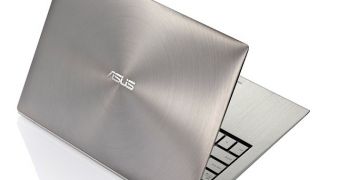Intel wants to increase the resolution of the display panels installed in next-generation of Ultrabooks built around Ivy Bridge processors in order to increase the usability of these devices and better compete with the high-PPI tablets which will arrive on the market.
During the IDF 2011 conference, Intel has presented a series of slides that explain why a higher resolution panel will make sense in the next-gen Ultrabooks.
In short, the Santa Clara chip maker believes that premium Ultrabook designs should go with 2560x1440, or even 2560x1600, screens as these are well suited for the viewing distances such notebooks are used at.
According to the Intel study, when viewed from 0.35 or 0.4 meters (1.14 or 1.31 feet) away, a 13.3-inch Ultrabook with a resolution of 2560x1440 would display a little bit more than 200 points per inch, which should be perfectly acceptable considering the high PPI screen used in smartphones.
For example, the Retina screen installed inside Apple's iPhone 4 and iPhone 4S has a pixel density of 326 PPI, which is more 50% bigger than that of the above mentioned Ultrabook display.
Furthermore, Intel doesn't see the resolution increase as a major source of concern when it comes to battery life as this change has a minor impact on the power consumption of an Ultrabook.
Intel expects this next-generation of Ultrabooks to arrive shortly after the introduction of its first mobile processors using the Ivy Bridge architecture.
These upcoming Intel chips will bring a series of improvements as far as the integrated graphics is concerned, including support for 4K resolutions.
The move to higher resolution panels in notebooks (not only Ultrabooks) should be a great benefit to users since most 13.3-, 14- and 15-inch models available on the market today are stuck with 1366x768 'HD ready' panels that have the same vertical real estate as 5-year old laptops. (via VR-Zone)

 14 DAY TRIAL //
14 DAY TRIAL // 

